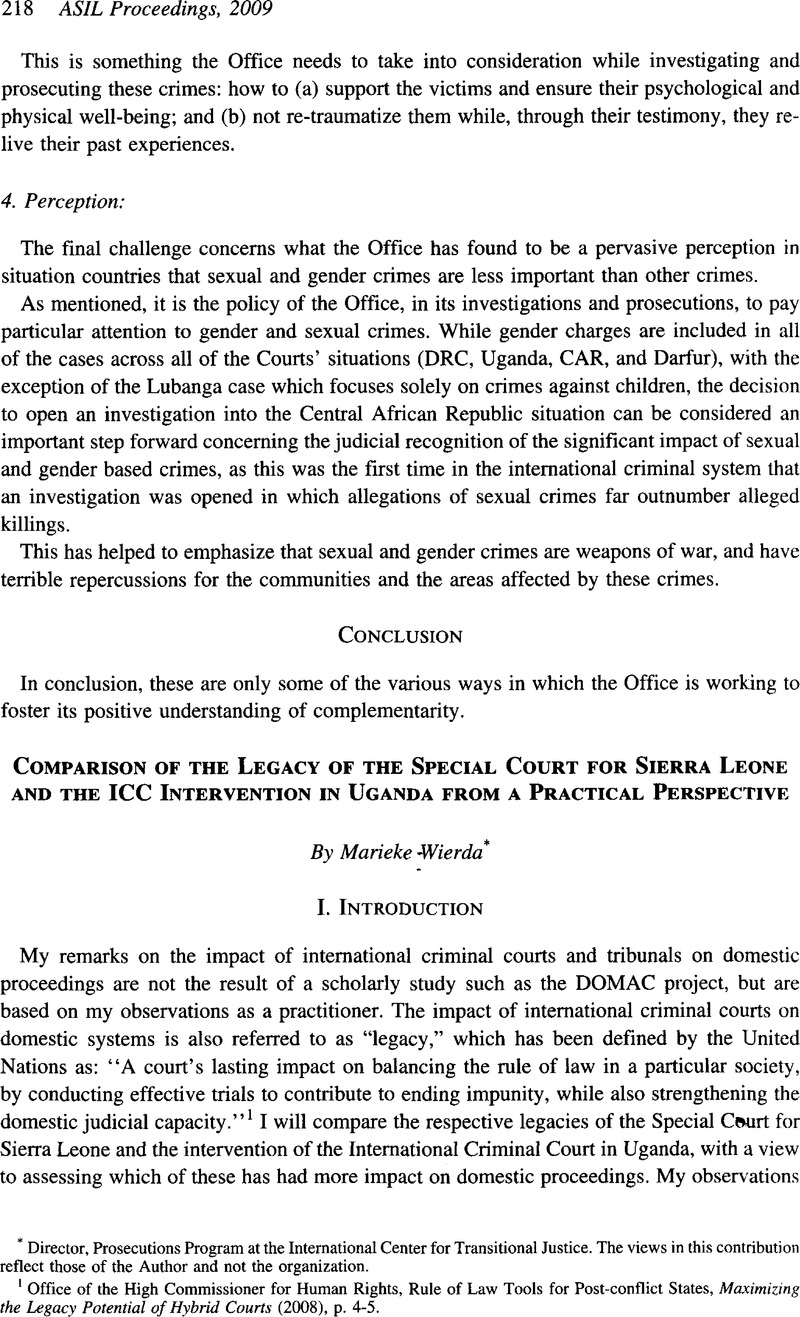No CrossRef data available.
Published online by Cambridge University Press: 28 February 2017

1 Office of the High Commissioner for Human Rights, Rule of Law Tools for Post-conflict States, Maximizing the Legacy Potential of Hybrid Courts (2008), p. 4-5.
2 See, e.g., ICTJ and UNDP’s Bureau for Conflict Prevention, The Legacy of the Special Court for Sierra Leone, Draft Discussion Paper (Sept. 2003).
3 Thierry Cruvellier, From the Taylor Trial to a Lasting Legacy: Putting the Special Court Model to the Test (International Center for Transitional Justice, 2009).
4 BBC World Service Trust, ICTJ and Search for Common Ground, Justice, Peace and Reconciliation in Sierra Leone: A Survey of Knowledge and Attitudes Towards Transitional Institutions in Post-Conflict Sierra Leone, Aug. 2008, available at <www.communicatingjustice.org>.
5 In fact, most of the debate on incorporation of international crimes has taken place in the context of domestication of the Rome Statute, but this has not yet been done.
6 Thierry Cruvellier, supra note 3, at 34.
7 Id. at 35-37.
8 The ICTJ participated in a day-long workshop with both delegations in Juba held in advance of the drafting of the Agreement, organized by the mediation team which was headed by the Vice President of South Sudan, Riek Machar. The workshop was chaired by the Paramount Chief of the Acholi, Rwot David Acana II. ICTJ presented on international standards, the ICC, and complementarity. There were additional presentations by the Justice and Reconciliation Project on traditional justice (Boniface Ojok), and by the legal advisor to the mediator on Ugandan law (Barney Afako).
9 See ICTJ & Berkeley’s Human Rights Center, Forgotten Voices (2005), available at <www.ictj.org>.
10 See ICTJ, Berkeley and Tulane, When the War Ends (2007), available at <www.ictj.org>.
11 The Public International Law and Policy Group is involved in giving technical assistance to drafting the International Crimes Bill in the context of Uganda.
12 The provisions of the Juba Agreement are currently being implemented by the Justice, Law and Order Sector (JLOS) in Uganda. JLOS has formed a Working Group on Transitional Justice which involves around one hundred lawyers from across the justice sector. It is headed by the Principal Judge, Justice James Ogoola.
13 A similar question about mitigation in sentencing arose in the context of the Justice and Peace Law (2005) in Colombia. Under that law as revised by the Colombian Constitutional Court, demobilized paramilitaries who have committed international crimes are currently eligible for reduced sentences of five to eight years, provided they meet certain conditions specified in the law.
14 ICTJ monitored the Fujimori trial and is publishing a major report forthcoming on <www.ictj.org>. It also has extensive programming around the domestic trials being conducted in Argentina and Colombia.
15 In late 2008, there was an attempt to set up a Special Tribunal for Kenya to try those responsible for the postelection violence that engulfed Kenya earlier in the year. Legislation was drafted but was not adopted by the Parliament.